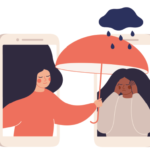Emotional Empathy
This perspective taking is vital for empathic responses, but is insufficient. Emotional empathy must couple with the cognitive element.9 Emotional empathy is the the ability to respond with an appropriate emotion to another’s mental states.
Because human beings are, at their core, social animals, our emotions are contagious and our ability to reciprocate those emotions are a sign of our humanity.10 One day, I had observed one of our fellows instinctively reach for his elbow when a patient mentioned she had elbow pain. It was instinctive and instantaneous, no different than using a reflex hammer to elicit the patellar reflex. In the same way, our facial expressions should express how we process our own emotions based on the patients’ stories.
At the mandatory five-hour training session, they told us to engage in reflecting words. “Patients love that!” the coach exclaimed. But this is only a shallow simulation of emotional empathy. When we hear pain or distress or, alternatively, joy and elation, we shouldn’t think about whether our patient satisfaction scores will increase if we reflect emotions; we should do it because it is what makes us human.
To the instructors’ credit, it’s hard to imagine a way to train people to gain this reflex (in the same way you can’t truly learn to do a knee reflex), but creating environments in which we can practice this, so that it becomes second nature, should be considered an institutional concern.
The intrusive nature of computers within the examination room has done great harm to the cause of providing emotional empathy. It’s hard to imagine a physician truly emoting and connecting with patients while they are on the computer jotting down notes and orders so they can hustle to the next patient on time, although data on this remains mixed.11 Similarly, when physicians are bearing such a high cognitive burden in taking care of patients, it can often be hard to have that instinctive emotional empathy.
That also means prioritizing clinician well-being so we can be in touch with our own emotions. It’s no secret that burnout is endemic among clinicians, and rates have increased in recent years due to structural changes in our healthcare system, as well as stresses placed on clinicians during the pandemic.12 The dehumanization that accompanies burnout can mute our ability to engage in emotional empathy. Unfortunately, no mandatory five-hour training can address that (and neither can free pizza).


